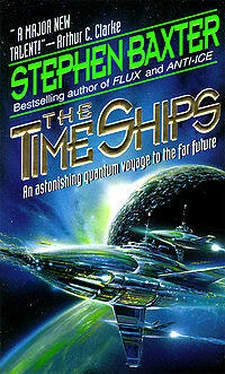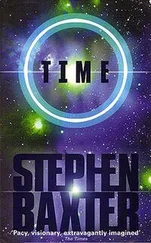Stephen Baxter - The Time Ships
Здесь есть возможность читать онлайн «Stephen Baxter - The Time Ships» — ознакомительный отрывок электронной книги совершенно бесплатно, а после прочтения отрывка купить полную версию. В некоторых случаях можно слушать аудио, скачать через торрент в формате fb2 и присутствует краткое содержание. Год выпуска: 1995, ISBN: 1995, Издательство: HarperCollins, Жанр: Фантастика и фэнтези, на английском языке. Описание произведения, (предисловие) а так же отзывы посетителей доступны на портале библиотеки ЛибКат.
- Название:The Time Ships
- Автор:
- Издательство:HarperCollins
- Жанр:
- Год:1995
- ISBN:0-002-24609-0
- Рейтинг книги:5 / 5. Голосов: 1
-
Избранное:Добавить в избранное
- Отзывы:
-
Ваша оценка:
- 100
- 1
- 2
- 3
- 4
- 5
The Time Ships: краткое содержание, описание и аннотация
Предлагаем к чтению аннотацию, описание, краткое содержание или предисловие (зависит от того, что написал сам автор книги «The Time Ships»). Если вы не нашли необходимую информацию о книге — напишите в комментариях, мы постараемся отыскать её.
by H. G. Wells, it was officially authorized by the Wells estate to mark the centenary of the original’s publication.
Won:
British SF Association Award in 1995
John W. Campbell Memorial Award for Best SF Novel in 1996
Philip K. Dick Award in 1996
Nominated for:
Hugo Award for Best Novel in 1996
Locus Award for Best SF Novel in 1996
Arthur C. Clarke Award in 1996
The Time Ships — читать онлайн ознакомительный отрывок
Ниже представлен текст книги, разбитый по страницам. Система сохранения места последней прочитанной страницы, позволяет с удобством читать онлайн бесплатно книгу «The Time Ships», без необходимости каждый раз заново искать на чём Вы остановились. Поставьте закладку, и сможете в любой момент перейти на страницу, на которой закончили чтение.
Интервал:
Закладка:
Thus, with Weena’s head cradled in my lap, I sat out the rest of that Dark Night.
In the morning I saw him emerge from the burnt forest in a pitiable state. His face was ghastly pale, and he had half-healed cuts on his face, a coat that was dusty and dirty, and a limp worse than a footsore tramp’s with only scorched grass bound up around his bloody feet. I felt a twinge of compassion — or perhaps of embarrassment — to see his wretchedness: had this really been me, I wondered? — had I presented such a spectacle to my friends, on my return, after that first adventure?
Again I had an impulse to offer help; but I knew that no assistance was necessary. My earlier self would sleep off his exhaustion through the brightness of the day, and then, as evening approached, he would return to the White Sphinx to retrieve his Time Machine.
Finally — after one last struggle against the Morlocks — he would be gone, in a whirl of attenuation.
So I stayed with Weena by the river, and nursed her while the sun climbed in the sky, and prayed that she might awaken.
Epilogue
My early days were the hardest, for I arrived here quite bereft of tools.
At first I was forced to live with the Eloi. I partook of the fruit brought to them by the Morlocks, and I shared the elaborate ruins they used as sleeping-halls.
When the moon waned, and the next sequence of Dark Nights came, I was struck by the boldness with which the Morlocks emerged from their caverns and assailed their human cattle! I set myself at the gate of a sleeping-house, with bits of iron and stone to serve as weapons, and in this way I was able to resist; but I could not keep them all out — the Morlocks swarm like vermin, rather than fight in the organized fashion of humans — and besides, I could defend only one sleeping-hall among hundreds dotted about the Thames Valley.
Those black hours, of fear and unparalleled misery for the defenseless Eloi, are as bleak as anything in my experience. And yet, with the coming of the day, that darkness was already banished from the little minds of the Eloi, and they were prepared to play and laugh as readily as if the Morlocks did not exist.
I was determined to make a change to this arrangement: for that with the rescue of Weena — had, after all, been my intention in returning here.
I have further explored the countryside hereabouts. I must have made a fine sight as I tramped the hills, with my wild and spectacular beard, my sunburnt scalp, and with my bulky frame draped in gaudy Eloi cloth! There is no transport, of course, and no beasts of burden to carry me, and only the remnants of my 1944 boots to protect my feet. But I have reached as far as Hounslow and Staines to the west, Barnet in the north, Epsom and Leatherhead to the south; and to the east, I have followed the Thames’s new course as far as Woolwich.
Everywhere I have found a uniform picture: the verdant landscape with its scattering of ruins, the halls and houses of the Eloi — and, everywhere, the grisly punctuation of the Morlock shafts. It may be that in France or Scotland the picture is very different! — but I do not believe it. The whole of this country, and beyond, is infested by the Morlocks and their subterranean warrens.
So I have been forced to abandon my first, tentative plan, which was to take a party of the Eloi out of the reach of the Morlocks: for now I know that the Eloi cannot escape the Morlock — and nor vice versa, for the dependency of Morlock on Eloi, while less repellent to my mind, is just as degrading to the spirit of those nocturnal sub-men.
I have begun, quietly, to seek other ways to live.
I determined to take up a permanent residence in the Palace of Green Porcelain. This had been one of my plans in my previous visit here, for, although I had seen evidence of Morlock activity there, that ancient museum with its large halls and robust construction had commended itself to me as defensible a fastness as I had found against the cunning and climbing dexterity of the Morlocks, and I retained hopes that many of the artifacts and relics stored here might yet serve my purposes in the future. And besides, something about that derelict monument to the intellect, with its abandoned fossils and crumbled libraries, had caught at my imagination! It was like a great ship from the past, its keel broken on the reef of time; and I was a castaway of like origin, a Crusoe from out of antiquity.
I repeated and extended my exploration of the cavernous halls and chambers of the Palace. I settled, for my base, on that Hall of Mineralogy which I found on my first visit, with its well-preserved but useless samples of a wider array of minerals than I could name. This chamber is rather smaller than some of the others, and so more easily secured; and, when I had swept it of dust and built a fire, it came to seem almost homelike to me. Since then, by shoring up the broken valves of doors and fixing breaches in the ancient walls, I have extended my fastness into some adjoining halls. While investigating the Gallery of Palaeontology, with its huge and useless brontosaurus bones, I came across a collection of bones tumbled about and scattered on the floor, evidently by the playful Eloi, of which at first I could make no sense; but when I roughly assembled the skeletons, I thought that they were of a horse, a dog, an ox, and, I think, of a fox — in short, they were the last relics of the ordinary animals of my own, vanished England. But the bones were too scattered and broken, and my anatomical understanding too imprecise, for me to be sure of my identification.
I have also returned to that ill-lit and sloping gallery which contains the hulking corpses of great machines, for this has served me as a mine for improvised tools of all descriptions — and not just weapons, as was my first use of it. I spent some time on one machine which had the appearance of an electrical dynamo, for its condition was not too ruinous to look at, and I entertained fantasies of starting it up, and lighting such of the broken globes which hang from that chamber’s ceiling as would take a current. I calculated that that blaze of electric light, and the noise of the dynamo, would send the Morlocks fleeing as nothing else! — but I have nothing in the way of fuel or lubricants, and besides the small parts of the hulk are seized up and corroded, and I have perforce abandoned that project.
In the course of my exploration of the Palace I came across a new exhibit which caught my fancy. This was close to the gallery with the model tin mine I had observed before, and it appeared to be a model of a city. This exhibit was finely detailed and so large it filled most of a chamber by itself, and the whole thing was protected by a sort of pyramid of glass, from which I had to wipe away centuries of dust to see. This city was evidently constructed far in my own future, but even the model was so ancient here in this sunset Age that its bright colors had faded at the dust-filtered touch of sunlight. I imagined this town might be a descendant of London, for I thought I saw the characteristic morphology of the Thames represented by a ribbon of glass which snaked through the exhibit’s heart. But it was a London greatly transformed from the city of my day. It was dominated by seven or eight huge glass palaces — if you think of the Crystal Palace, vastly extended and several times twinned, you will have something of the effect and these palaces had been joined over by a sort of skin of glass which carapaced the whole of the city. There was nothing of the somberness of the London Dome of 1938, for this immense roof served to catch and amplify the sunlight, it seemed to me, and there were ribbons of electric lamps set about the city — though none of their pin-point bulbs still functioned in my model. There was a forest of immense wind-mills set up over this roof — though the vanes no longer turned — and great platforms were set here and there about the roof, over which hovered toy versions of flying machines. These machines had something of the look of great dragonflies, with huge tiers of sails hovering over them, and gondolas with rows of toy people sitting in them beneath.
Читать дальшеИнтервал:
Закладка:
Похожие книги на «The Time Ships»
Представляем Вашему вниманию похожие книги на «The Time Ships» списком для выбора. Мы отобрали схожую по названию и смыслу литературу в надежде предоставить читателям больше вариантов отыскать новые, интересные, ещё непрочитанные произведения.
Обсуждение, отзывы о книге «The Time Ships» и просто собственные мнения читателей. Оставьте ваши комментарии, напишите, что Вы думаете о произведении, его смысле или главных героях. Укажите что конкретно понравилось, а что нет, и почему Вы так считаете.









